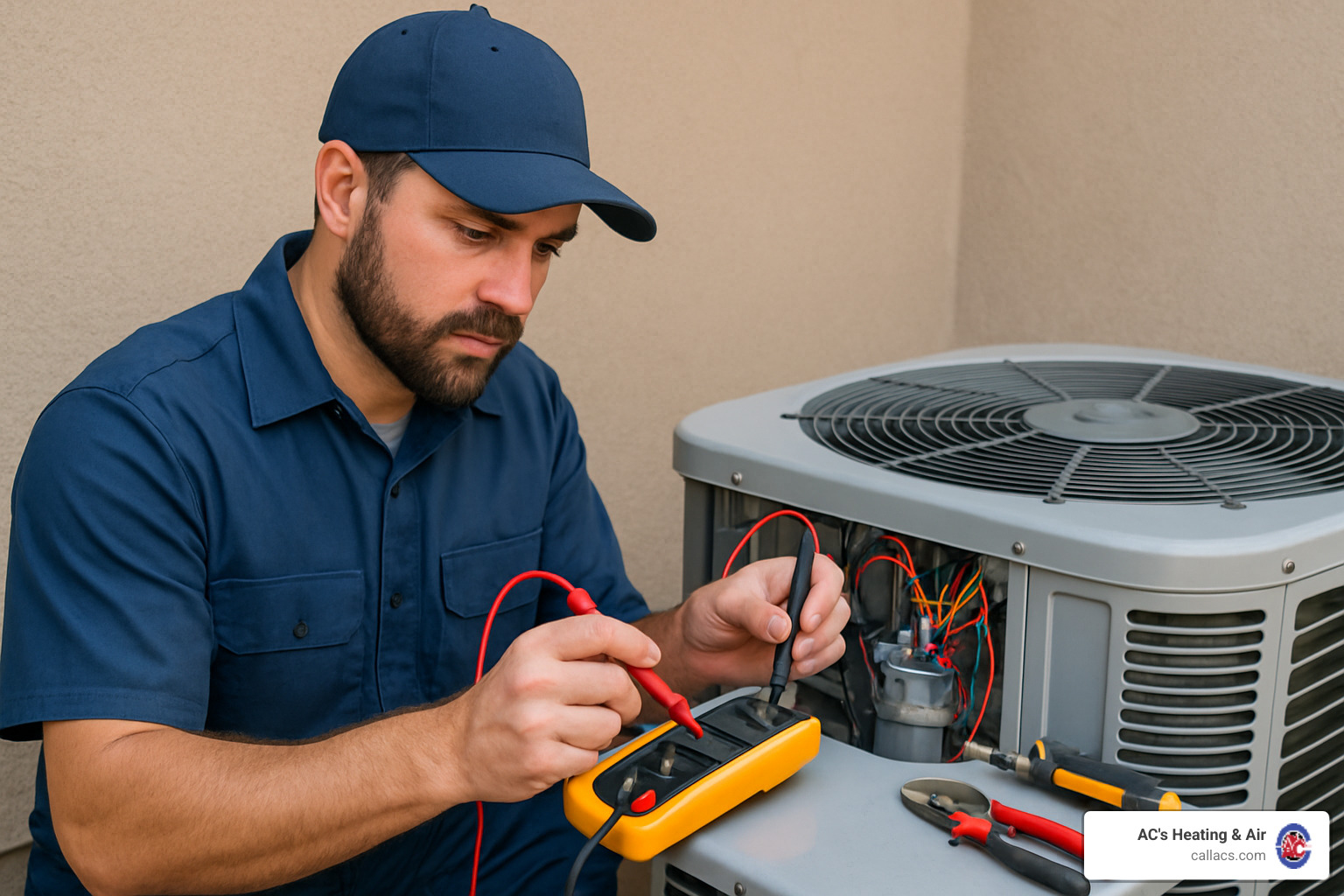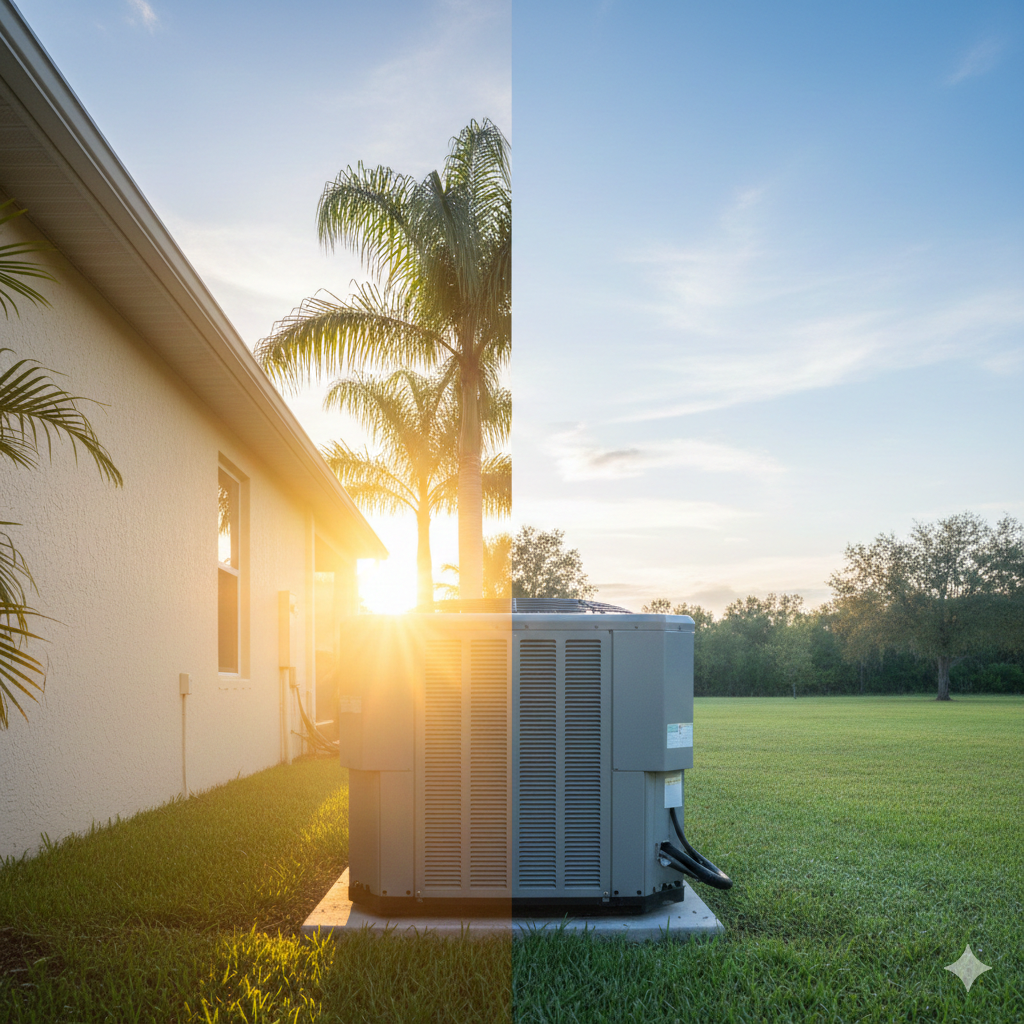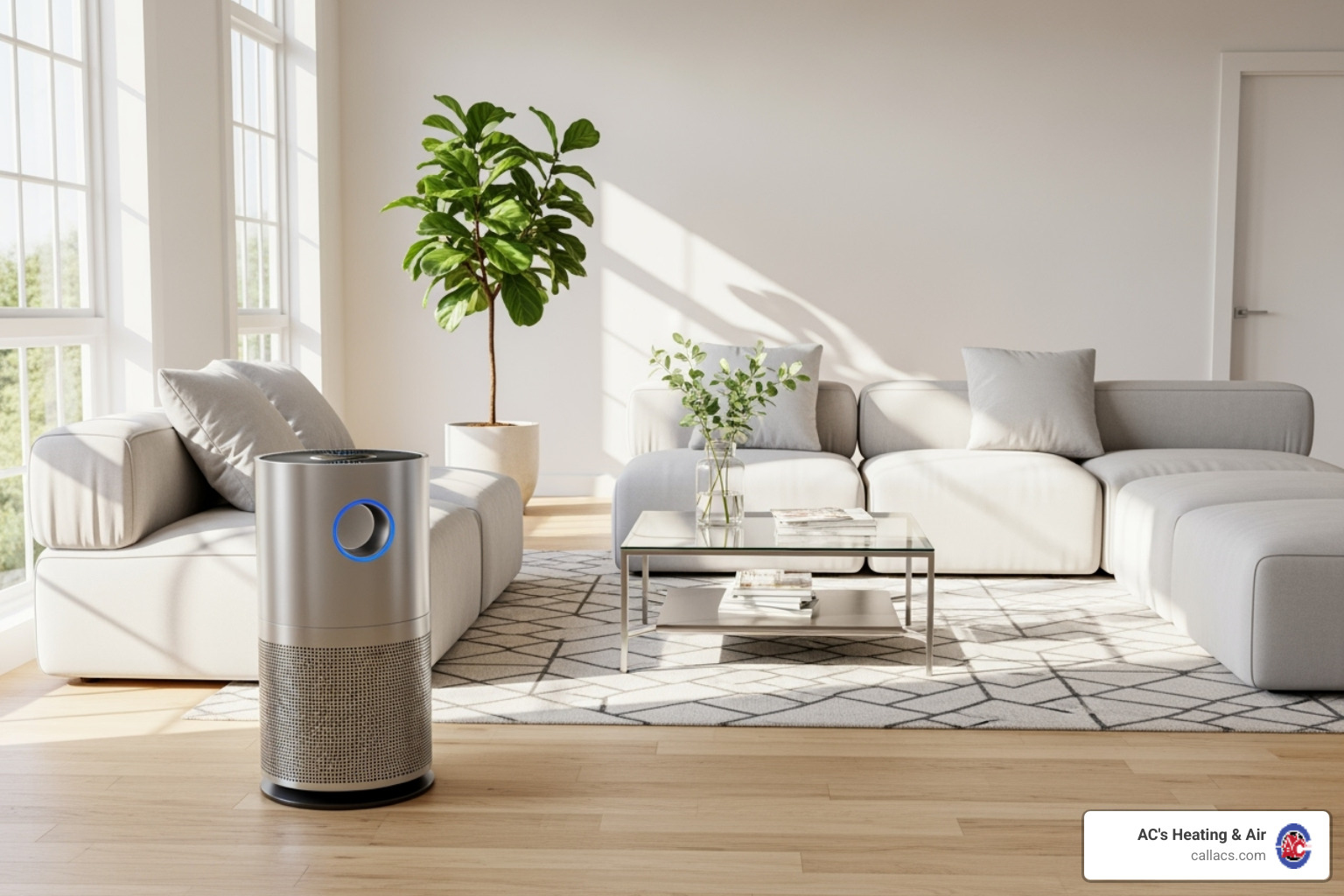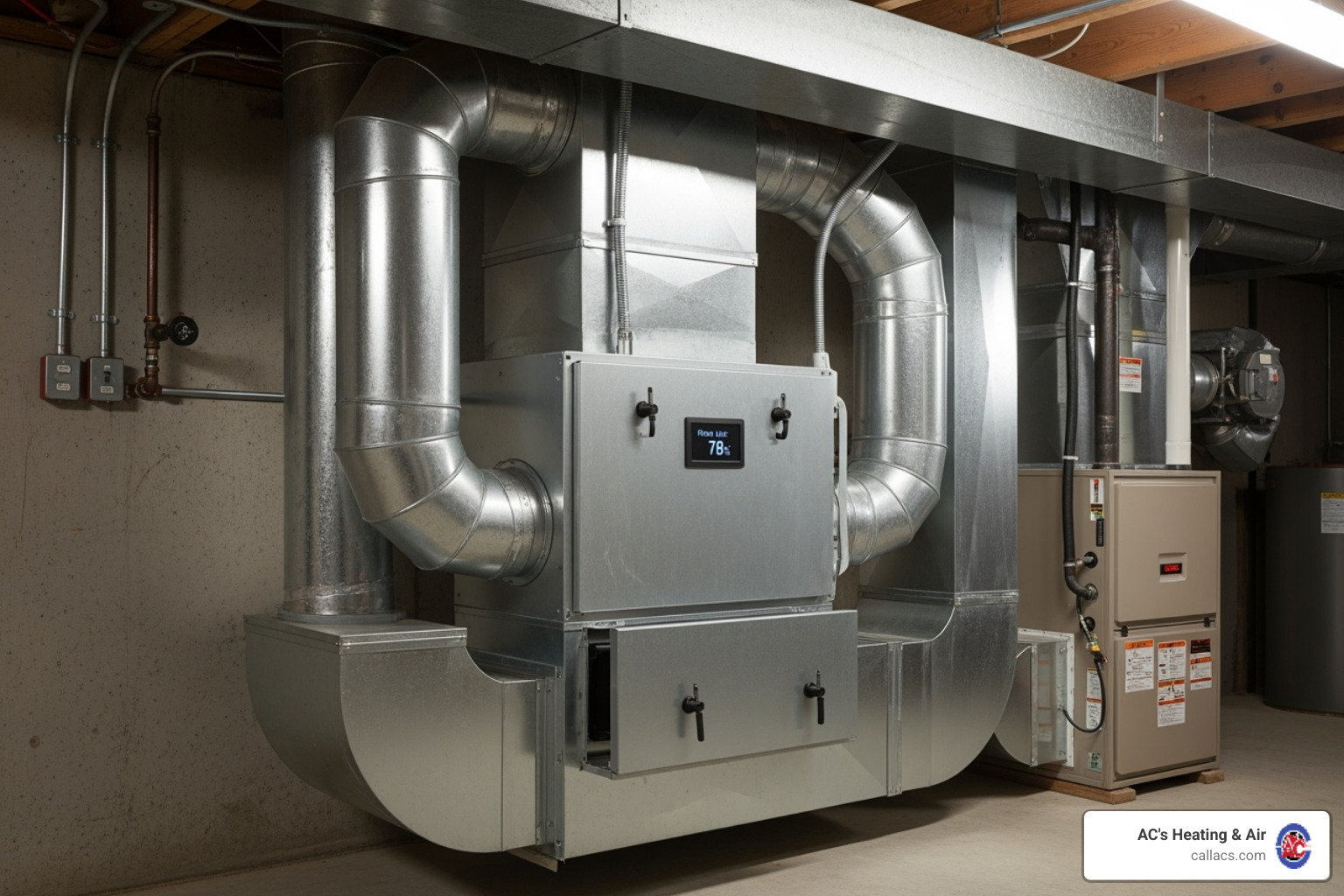Stay Cool: How to Fix Common Central Air Issues

When Your Central Air Stops Working: Understanding the Most Common Issues
Central air conditioning problems can turn your comfortable home into an unbearable sauna, especially during Florida's sweltering summers. The most frequent issues homeowners face include:
Quick Problem Identification:
- Not cooling - Check thermostat settings, replace dirty filters, reset tripped breakers
- Running constantly - Dirty filters, low refrigerant, or oversized unit issues
- Not turning on - Electrical problems, thermostat issues, or blown fuses
- Ice buildup - Restricted airflow from dirty filters or low refrigerant levels
- Water leaks - Clogged condensate drain or frozen coils
- Strange noises - Loose parts, failing motors, or debris in outdoor unit
- High energy bills - Dirty coils, duct leaks, or aging system components
When temperatures regularly surpass 90°F in Central Florida, a working AC system isn't just comfort - it's essential.
Most central air conditioning problems fall into three categories: airflow issues (dirty filters, blocked vents), electrical failures (tripped breakers, bad capacitors), and refrigerant problems (leaks, frozen coils). The average AC system lasts 15-20 years, but regular maintenance can prevent many common breakdowns.
I'm Allen Chenault, owner of AC's Heating & Air LLC, and in my 20+ years in the HVAC industry, I've seen how understanding central air conditioning problems helps homeowners stay comfortable while avoiding costly emergency repairs.

Central air conditioning problems terms you need: - Air conditioner freezing up, - HVAC compressor troubleshooting, - Air conditioner making noise
Central Air Conditioning Problems 101
When your central air conditioning system starts acting up, it helps to understand what's happening behind the scenes. Your AC works by circulating refrigerant between an indoor evaporator coil and outdoor condenser unit, with a compressor moving heat from inside your home to the outside.
But here's the thing about central air conditioning problems - when one part of this carefully balanced system breaks down, everything else starts struggling too. Your AC becomes like a chain with a weak link, working overtime just to keep you marginally comfortable.
The usual suspects behind most cooling headaches include dirty air filters that choke off airflow, thermostat gremlins with wrong settings or faulty sensors, and frozen evaporator coils that turn your AC into an expensive ice maker. You'll also run into low refrigerant levels from sneaky leaks, tripped circuit breakers protecting your home from electrical overload, and ductwork issues that let your expensive cool air escape.
Don't forget about system age either - after 10-15 years of Florida summers, even the toughest AC components start showing their age. When your energy bills suddenly spike without explanation, that's often your first clue something's gone sideways.
For those frustrating moments when your AC Running But Not Cooling, we've got specific troubleshooting steps that can save your sanity (and your wallet).
What Makes "Central Air Conditioning Problems" Different From Window-Unit Issues?
Central air conditioning problems are in a completely different league than window unit hiccups. When your window unit dies, you lose cooling in one room. When central air fails, your entire home becomes a sauna.
System size and complexity make all the difference. Your central air system has components scattered throughout your home - that outdoor condenser working hard in the Florida heat, an indoor air handler tucked away in a closet or attic, miles of ductwork snaking through walls, and thermostat controls managing the whole show.
Ductwork dependencies create their own headaches too. Window units blast air directly where you need it, but central air relies on a network of ducts to deliver comfort to every room. Leaky ducts are like having holes in a garden hose - you're paying to cool spaces you'll never enjoy.
The whole-home impact means there's no escaping a central air problem. It affects your temperature, humidity levels, and air quality from the master bedroom to the kitchen.
Top 10 Warning Signs Your Central Air Conditioner Is In Trouble
Your AC usually gives you warning signs before it completely gives up the ghost. Learning to recognize these red flags can save you from emergency service calls.
Warm air blowing from your vents is the classic "something's wrong" signal - check your thermostat settings first, then start thinking about refrigerant leaks or compressor troubles. Short cycling where your system turns on and off like it can't make up its mind usually points to electrical problems or refrigerant issues.
Strange noises deserve immediate attention - grinding, squealing, or clanking sounds mean mechanical parts are crying for help. Bad smells tell their own story: musty odors suggest mold lurking in your ducts, while burning smells scream electrical problems.
Water leaks around your units signal drainage troubles, while ice formation on coils means airflow restrictions or leaks are choking your system. When your home feels sticky despite the AC running, your system isn't pulling moisture from the air like it should.
Frequent breaker trips mean your electrical protection is working overtime, skyrocketing energy bills indicate your system's efficiency has taken a nosedive, and thermostat errors with inaccurate readings throw off your entire system's operation.
The Department of Energy offers comprehensive details about these issues in their guide to Common Air Conditioner Problems.
DIY Troubleshooting & Maintenance Checklist

When your AC starts acting up, don't panic. About 70% of common central air conditioning problems can be solved with simple troubleshooting steps that don't require professional help.
Start with the basics that solve most problems quickly. Check your thermostat settings first - make sure it's set to "Cool" mode and lower the temperature about 5 degrees below your current room temperature. Switch the fan setting from "On" to "Auto" to prevent the system from running continuously.
Next, inspect your circuit breaker and reset it if it's tripped. Head outside and clear any debris from around your outdoor unit - grass clippings, leaves, or weeds often block airflow and cause problems. Make sure all your vents are open and unobstructed throughout the house, and check your condensate drain for backups.
Your monthly maintenance routine doesn't need to be complicated, but consistency makes all the difference. Replace or clean your air filters every 30 to 90 days depending on your home's dust levels and whether you have pets. Take a walk around your outdoor unit monthly to check for damage or debris buildup.
Check your thermostat batteries if you have a programmable model - dead batteries cause more problems than you'd think. Clear your condensate drain line with a simple mixture of water and vinegar to prevent algae buildup. Keep at least two feet of clearance around your outdoor unit for proper airflow, and listen for unusual noises during operation.
For more detailed seasonal maintenance that prevents most breakdowns, check out our comprehensive AC Maintenance Tips guide.
Step-by-Step Guide To Solving Everyday Central Air Conditioning Problems
When your AC isn't cooling properly, start with your thermostat settings. Ensure it's set to "Cool" and the temperature is set below your current room temperature. Replace that dirty air filter - it's the number one cause of cooling problems because clogged filters restrict airflow and reduce your system's cooling capacity.
Open any closed vents throughout your home. Closing vents actually increases pressure in your ductwork and reduces overall efficiency. Clear debris from your outdoor unit by removing leaves, grass, and weeds that block airflow through the condenser coils. If your breaker has tripped, reset it and see if the system starts working normally.
Water leaking from your system needs immediate attention. Turn off your AC right away to prevent water damage to your home. Check the condensate drain for clogs - you can usually clear minor blockages with a wet/dry vacuum. Replace your air filter if it's dirty, as restricted airflow can cause coils to freeze and overflow the drain pan.
Frozen coils require patience more than anything else. Turn off your AC and switch your thermostat fan to "On" to keep air circulating. Allow 24 hours for complete thawing - rushing this process can damage your system. Replace your air filter before restarting and check for any airflow obstructions. If the problem happens again, you likely have a refrigerant leak that needs professional attention.
When your system won't start at all, check your thermostat batteries and settings first. Inspect your circuit breaker and reset it if needed. Make sure the outdoor disconnect switch near your condenser unit is turned on. Clear your condensate drain if your system has a safety switch that shuts everything down when the drain backs up.
Central Air Conditioning Problems You Should Never Ignore
Some problems need immediate professional attention to prevent expensive damage.
Refrigerant leaks show up as hissing sounds, ice buildup, and reduced cooling capacity. Low refrigerant doesn't just make your home uncomfortable - it can destroy your compressor, which costs thousands to replace. Never attempt DIY refrigerant repairs. It's illegal without proper certification, and you can seriously damage your system.
Electrical burning smells mean turn off your system immediately and call a professional. Electrical problems can cause house fires, so don't take chances.
Repeated breaker trips signal that something's drawing too much power. If resetting the breaker doesn't solve the problem permanently, electrical components are failing and need professional diagnosis.
Compressor problems are the big one. Your compressor is like your system's heart - when it stops working, everything stops. If your compressor won't start or makes grinding noises, shut down the system and call for help.
Significant water leaks require immediate action. As heating and cooling experts note, you should turn it off immediately to avoid costly water damage when you notice water pooling around your system.
Beyond Quick Fixes: Electrical, Refrigerant & Mechanical Failures

Sometimes your central air conditioning problems go deeper than a dirty filter or tripped breaker. When the basic fixes don't work, you're likely dealing with electrical failures, refrigerant issues, or worn-out mechanical parts that need a professional's touch.
Capacitor failures are probably the most common electrical culprit - these little cylindrical components help start your compressor and fan motors. When they go bad, your AC simply won't start. Contactor problems can interrupt the electrical flow to major components, while refrigerant leaks slowly rob your system of its cooling power.
Compressor mechanical failure is the big one that homeowners dread. This is your system's heart, and when it goes, you're looking at some serious repair decisions. Blower motor bearing wear creates annoying noises and reduces airflow, while fan motor failures stop your outdoor unit from rejecting heat properly.
If your AC Unit Is Not Kicking On, electrical components are usually the troublemakers. These failures need specialized tools and know-how to diagnose safely - definitely not DIY territory.
Diagnosing Hard-to-Spot Electrical Faults
Electrical problems cause nearly half of all AC failures, but they're tricky to diagnose without the right equipment.
Capacitors are like tiny batteries that give motors the extra push they need to start. We see failed capacitors all the time in Florida's heat - they're working overtime in our climate. When we test them with a multimeter, we're checking if they can still store the right amount of electrical energy. A bad capacitor means your compressor or fan won't start.
Contactors are basically heavy-duty electrical switches that control power to your major components. Over time, the contacts get pitted and burned from all that electrical switching. When we inspect them, we're looking for signs of burning or pitting that prevents proper operation.
Fuses and breakers are your system's bodyguards - they protect against electrical overload. But when they blow or trip repeatedly, something's wrong. We don't just replace them and hope for the best. We dig deeper to find out why your system is drawing too much power.
Voltage problems can slowly kill your equipment. Your AC needs the right amount of electrical pressure to run efficiently. Too little voltage makes components work harder, while too much can fry them instantly.
Refrigerant & Freezing: The Science Behind Icy Coils
Your AC makes ice by accident, not on purpose. Understanding why helps explain many central air conditioning problems.
Your evaporator coil normally runs around 40°F, just above freezing. It's walking a tightrope between cooling your air and turning into a block of ice. When that balance gets disrupted, ice wins.
Proper airflow is what keeps your coil from freezing. When air flows over the coil at the right speed, it carries away just enough heat to keep things balanced. But dirty filters, closed vents, or a failing blower motor slow down that airflow. Less airflow means your coil temperature drops below freezing.
Refrigerant pressure directly controls how cold your coil gets. When you have a leak, pressure drops and your coil gets colder than it should. It's like letting air out of a tire - less pressure means less performance.
Finding leaks requires detective work. We listen for hissing sounds, look for oily stains around connections, and use electronic leak detectors. Sometimes we add UV dye to the system so leaks glow under black light.
For more details about why systems freeze up, check out this comprehensive guide on air conditioner ice -- why does AC freeze.
Mechanical Failures That End a Compressor's Life
The compressor is your AC's most expensive component - and unfortunately, it's not immortal. Understanding what kills compressors helps you make smart decisions when yours starts showing its age.
Age-related wear is inevitable. Your compressor has moving parts that work incredibly hard, especially in Florida's demanding climate. After 15-20 years of faithful service, internal components develop wear patterns that reduce efficiency and increase noise.
Overheating damage is a compressor killer. When condenser coils get dirty, refrigerant runs low, or electrical problems develop, your compressor works harder and runs hotter. Excessive heat breaks down the oil that lubricates internal parts, leading to metal-on-metal contact and eventual failure.
Contamination issues can poison your entire system. Moisture, acids, or debris in the refrigerant circuit act like sandpaper on compressor internals. That's why proper evacuation and filtration during repairs is so critical.
When your compressor fails, you face a tough decision. System age plays a huge role in whether repair makes financial sense. A 5-year-old system with a bad compressor? Definitely worth fixing. A 20-year-old system? Probably time to upgrade.
Repair costs vary depending on what failed and how accessible it is. Replacement costs depend on your home's size, efficiency preferences, and any ductwork modifications needed. We'll walk you through both options so you can make the choice that's right for your family and budget.
Preventive Maintenance & System Longevity

Think of your central air system like your car - regular maintenance prevents most breakdowns and keeps everything running smoothly. The best part? Preventive care stops 80% of central air conditioning problems before they happen and can extend your system's life by 5-10 years.
I've seen too many homeowners face expensive emergency repairs that could have been prevented with simple maintenance. A well-maintained AC system uses 15-20% less energy, which translates to real savings on your monthly electric bill. In Florida's climate, that difference really adds up.
Annual maintenance delivers amazing benefits: your system runs more efficiently, you'll have fewer surprise breakdowns, your equipment lasts longer, and your indoor air stays cleaner. Plus, most manufacturers require professional maintenance to keep your warranty valid.
Our AC Preventative Maintenance program takes the guesswork out of system care. We handle the technical stuff so you can enjoy reliable comfort year-round.
Extending Lifespan While Cutting Energy Bills
The secret to a long-lasting AC system isn't complex - it's consistency. Small maintenance tasks performed regularly prevent major problems and keep your system running at peak efficiency.
Filter changes make the biggest difference. Replace standard 1-inch filters monthly during our hot Florida summers, and every three months during cooler periods. If you upgrade to 4-inch media filters, you'll get better air quality and can change them less frequently.
Clean coils are happy coils. Your outdoor condenser coils need annual cleaning, more often if you live in a dusty area or have lots of trees nearby. Dirty coils reduce your system's ability to reject heat by 30%, forcing it to work much harder to cool your home.
Duct sealing pays for itself quickly. Leaky ducts waste 20-30% of your system's cooling capacity - that's like leaving windows open while running your AC. Professional duct sealing stops this waste and improves comfort throughout your home.
Keep your outdoor unit breathing. Maintain at least two feet of clearance around your condenser unit. Trim bushes regularly and remove leaves, grass clippings, and debris that can block airflow.
Smart thermostat settings save money. Program your thermostat to raise the temperature 7-10 degrees when you're away from home. This simple step can cut your cooling costs by 10% without affecting your comfort when you're home.
Professional Service Schedule: When & Why
Timing matters when it comes to AC maintenance. Spring tune-ups are crucial because they catch developing problems before the peak cooling season arrives. Nobody wants their AC to fail during a 95-degree July afternoon when every technician in Central Florida is booked solid.
Some situations always require professional attention. Refrigerant leaks need proper diagnosis and repair - it's not a DIY job. Electrical component failures can be dangerous to handle without proper training and tools. Water leaks or drainage problems can cause expensive damage if not addressed quickly. Repeated breaker trips usually indicate serious electrical issues that need immediate professional diagnosis.
Here's something many homeowners don't realize: warranty protection depends on professional maintenance. Most manufacturers require annual professional service to keep expensive component warranties valid. Skipping professional maintenance can void warranties worth thousands of dollars.
When you need expert repair services, our Air Conditioning Repair Services team handles everything from minor adjustments to major component replacements. We've been keeping Central Florida homes comfortable for years, and we understand how our climate affects your AC system.
Frequently Asked Questions about Central Air Conditioning Problems

Why is my central air conditioner running but not blowing cold air?
This common problem has several possible causes:
Thermostat Issues: Verify the thermostat is set to "Cool" mode and the temperature is set below room temperature. If the fan is set to "On" instead of "Auto," it runs continuously, sometimes blowing warm air when the system isn't actively cooling.
Dirty Air Filter: A clogged filter restricts airflow, reducing cooling capacity. Replace filters every 30-90 days, more frequently if you have pets or live in dusty areas.
Refrigerant Problems: Low refrigerant levels prevent proper heat absorption. Look for ice buildup on coils or refrigerant lines, which indicates leaks requiring professional repair.
Electrical Failures: Tripped breakers, failed capacitors, or bad contactors can prevent the outdoor unit from operating while the indoor fan continues running.
What causes a central air conditioner to freeze up?
Ice formation on your AC system indicates restricted airflow or refrigerant problems:
Airflow Restrictions: Dirty filters, closed vents, or failed blower motors reduce airflow across the evaporator coil. With insufficient airflow, the coil temperature drops below freezing, creating ice.
Low Refrigerant: Refrigerant leaks reduce system pressure, lowering coil temperature and causing ice formation. Ice buildup often indicates refrigerant loss requiring professional repair.
Operating Conditions: Running your AC when outdoor temperatures drop below 60°F can cause coil freezing. Avoid operating the system in cold weather.
Mechanical Issues: Failed expansion valves, dirty coils, or ductwork problems can disrupt proper refrigerant flow and cause freezing.
How do I know if my AC is the right size for my home?
Proper sizing ensures efficient operation and comfortable temperatures:
Sizing Guidelines: Air conditioners are sized by BTUs (British Thermal Units). A general rule is 20 BTUs per square foot, but factors like insulation, ceiling height, and window exposure affect requirements.
Signs of Oversizing: An oversized unit cools quickly but doesn't run long enough to remove humidity, leaving your home feeling clammy. Short cycling also increases wear on components.
Signs of Undersizing: An undersized unit runs continuously but never reaches the set temperature, especially on hot days. Energy bills remain high despite constant operation.
Professional Load Calculation: Proper sizing requires detailed load calculations considering your home's construction, orientation, insulation, and local climate. This ensures optimal comfort and efficiency.

Conclusion
Understanding central air conditioning problems empowers you to maintain cool comfort while protecting your investment. Throughout this guide, we've covered everything from simple filter changes to complex refrigerant issues - giving you the knowledge to tackle basic problems while knowing when to call for help.
The truth is, many AC issues have surprisingly simple solutions. A dirty filter causes more problems than most homeowners realize, and a tripped breaker can leave you sweating unnecessarily. But here's what I've learned in my years serving Central Florida families: knowing your limits keeps you safe and saves money.
Safety always comes first when dealing with electrical components or refrigerant systems. Turn off power before any inspection, and never attempt DIY refrigerant repairs. These systems operate under high pressure and voltage - one mistake can cause serious injury or expensive damage.
Annual professional service remains your best defense against unexpected breakdowns. I've seen too many emergency calls that could have been prevented with simple spring maintenance. In Florida's demanding climate, your AC works overtime compared to systems in cooler regions, making regular care even more critical.
Acting quickly when problems arise prevents minor issues from snowballing into major repairs. That strange noise or slight reduction in cooling often signals developing problems that are cheaper to fix early. Waiting until complete failure means emergency service calls and potentially damaged components.
Central Florida's long cooling seasons and high humidity create unique challenges for AC systems. We understand these demands at AC's Heating & Air, having served families throughout Apopka, Winter Park, Orlando, and Winter Garden for years. Our technicians know what works in our climate and what doesn't.
Don't let central air conditioning problems leave you uncomfortable through another sweltering Florida summer. Regular maintenance, quick attention to warning signs, and professional service when needed keep your home cool and your family comfortable year-round.
For comprehensive professional air conditioning repair custom to Central Florida's unique climate challenges, visit our AC repair page to learn how we can keep your home cool and comfortable through every season.



